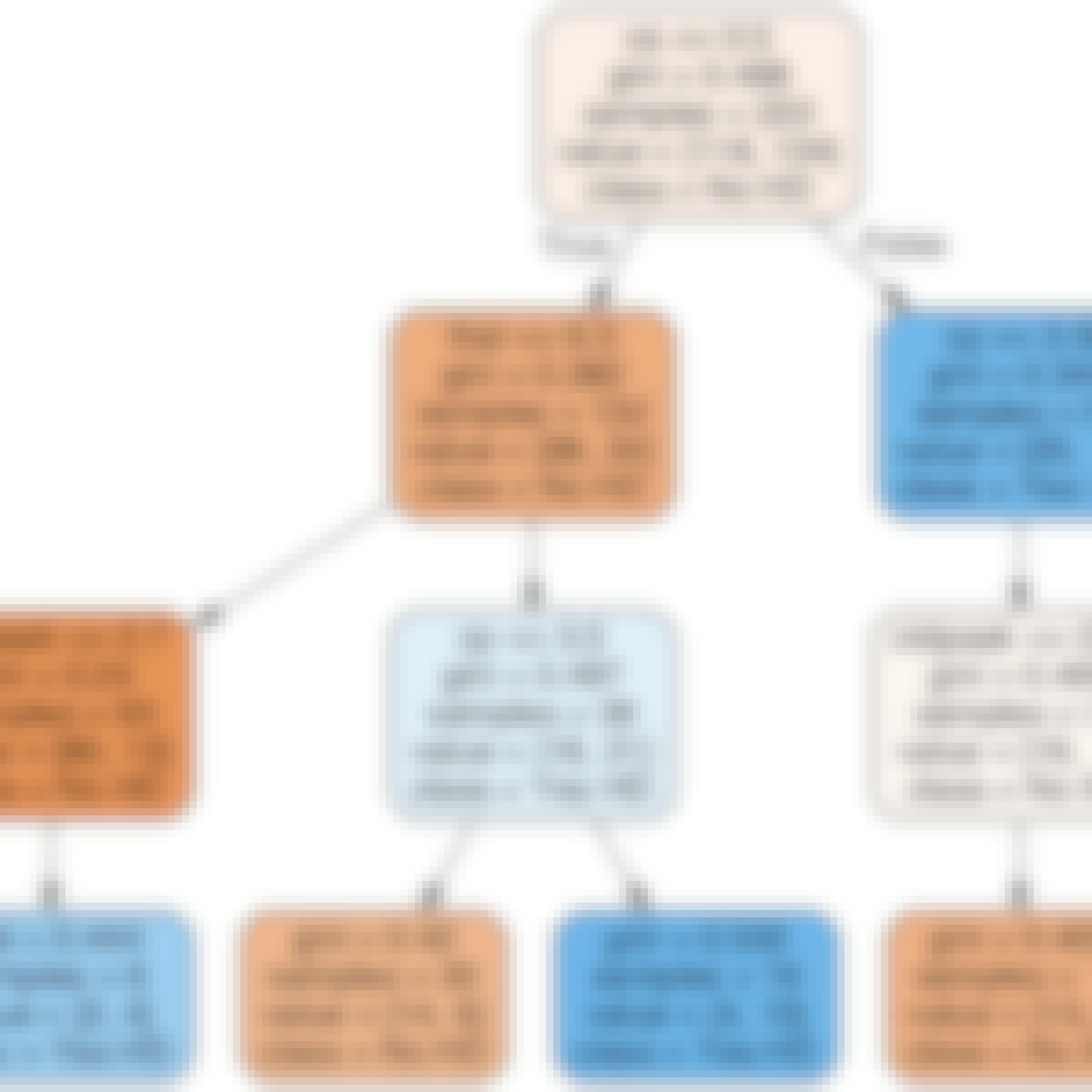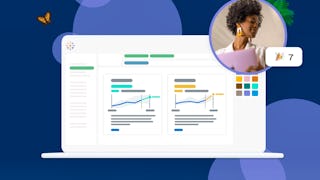- Browse
- Logistic Regression
Results for "logistic regression"

Skills you'll gain: Decision Tree Learning, Data Preprocessing, Data Transformation, Supervised Learning, Feature Engineering, Scikit Learn (Machine Learning Library), Classification Algorithms, Model Evaluation, Pandas (Python Package)
4.6·Rating, 4.6 out of 5 stars232 reviewsIntermediate · Guided Project · Less Than 2 Hours
 Status: Free TrialFree TrialE
Status: Free TrialFree TrialEEdureka
Skills you'll gain: Power BI, Data Visualization, Data Analysis Expressions (DAX), Matplotlib, Plotly, Data Analysis, Exploratory Data Analysis, Seaborn, SQL, Pandas (Python Package), Probability & Statistics, Regression Analysis, Machine Learning, Statistical Hypothesis Testing, Python Programming, Data Transformation, Feature Engineering, Data Integration, NumPy, Web Scraping
4.1·Rating, 4.1 out of 5 stars23 reviewsIntermediate · Specialization · 3 - 6 Months
 Status: Free TrialFree TrialJ
Status: Free TrialFree TrialJJohns Hopkins University
Skills you'll gain: Statistics, Regression Analysis, Probability, Statistical Hypothesis Testing, Probability Distribution, Statistical Analysis, Statistical Inference, Sampling (Statistics), Combinatorics
4.6·Rating, 4.6 out of 5 stars18 reviewsIntermediate · Course · 1 - 4 Weeks
 Status: Free TrialFree TrialT
Status: Free TrialFree TrialTTableau Learning Partner
Skills you'll gain: Exploratory Data Analysis, Tableau Software, Data Preprocessing, Data Analysis, Descriptive Statistics, Predictive Analytics, Box Plots, Statistical Analysis, Scatter Plots, Data Visualization Software, Trend Analysis, Analytics, Histogram, Business Analytics, Data Manipulation, Regression Analysis, Correlation Analysis
4.4·Rating, 4.4 out of 5 stars103 reviewsBeginner · Course · 1 - 4 Weeks
 Status: Free TrialFree TrialU
Status: Free TrialFree TrialUUniversidades Anáhuac
Skills you'll gain: Predictive Modeling, Model Evaluation, Time Series Analysis and Forecasting, Statistical Modeling, Data Modeling, Forecasting, Supervised Learning, Regression Analysis, Feature Engineering, Scikit Learn (Machine Learning Library), Data Preprocessing, Unsupervised Learning, Machine Learning, Logistic Regression, Classification Algorithms
Intermediate · Course · 1 - 4 Weeks
 Status: FreeFreeT
Status: FreeFreeTThe Chinese University of Hong Kong
Skills you'll gain: SPSS, Model Evaluation, SPSS (Software), Statistical Modeling, Correlation Analysis, Social Sciences, Statistical Analysis, Regression Analysis, Data Manipulation, Quantitative Research, Exploratory Data Analysis, Data Analysis
4.8·Rating, 4.8 out of 5 stars95 reviewsMixed · Course · 3 - 6 Months
 Status: Free TrialFree TrialH
Status: Free TrialFree TrialHHoward University
Skills you'll gain: Data Wrangling, Linear Algebra, Regression Analysis, NumPy, Predictive Modeling, Dimensionality Reduction, Data Science, Data Visualization, Applied Mathematics, Data Preprocessing, Statistical Modeling, Jupyter, Data Analysis, Machine Learning Methods, Mathematical Modeling, Algebra, Exploratory Data Analysis, Python Programming, Model Evaluation, Statistical Analysis
4.3·Rating, 4.3 out of 5 stars32 reviewsBeginner · Specialization · 3 - 6 Months
 Status: Free TrialFree TrialB
Status: Free TrialFree TrialBBoard Infinity
Skills you'll gain: Software Testing, Test Case, Integration Testing, System Testing, Software Development Life Cycle, Acceptance Testing, Software Quality Assurance, Unit Testing, White-Box Testing, Regression Testing, Usability Testing
4.6·Rating, 4.6 out of 5 stars23 reviewsBeginner · Course · 1 - 4 Weeks
 Status: PreviewPreviewS
Status: PreviewPreviewSS.P. Jain Institute of Management and Research
Skills you'll gain: Descriptive Statistics, Data Analysis, Analytics, Quantitative Research, Sampling (Statistics), Probability & Statistics, Business Analytics, Statistical Analysis, Regression Analysis, Data-Driven Decision-Making, Statistical Hypothesis Testing, Business Analysis, Microsoft Excel, Variance Analysis, Statistical Inference
Build toward a degree
4.5·Rating, 4.5 out of 5 stars22 reviewsBeginner · Course · 1 - 3 Months
 Status: Free TrialFree TrialE
Status: Free TrialFree TrialEEdureka
Skills you'll gain: Generative AI, Retrieval-Augmented Generation, Large Language Modeling, Generative Adversarial Networks (GANs), Tensorflow, ChatGPT, OpenAI, Natural Language Processing, Artificial Intelligence and Machine Learning (AI/ML), Responsible AI, Prompt Engineering, Applied Machine Learning, Machine Learning, Deep Learning, Machine Learning Algorithms, Computer Vision, Predictive Modeling, Supervised Learning, Text Mining, Image Analysis
3.7·Rating, 3.7 out of 5 stars62 reviewsIntermediate · Specialization · 3 - 6 Months
 Status: Free TrialFree TrialU
Status: Free TrialFree TrialUUniversity of Minnesota
Skills you'll gain: Test Automation, Regression Testing, Software Testing, Software Development Tools, Unit Testing, White-Box Testing, Code Coverage, Security Testing, Verification And Validation, Test Case, Test Data, Debugging, Automation, Application Security
4.2·Rating, 4.2 out of 5 stars83 reviewsIntermediate · Course · 1 - 4 Weeks
 Status: Free TrialFree TrialE
Status: Free TrialFree TrialEEmory University
Skills you'll gain: Customer Analysis, Customer Demand Planning, Marketing Analytics, Forecasting, Consumer Behaviour, Marketing Effectiveness, Model Evaluation, Time Series Analysis and Forecasting, Microsoft Excel, Marketing, Regression Analysis, Customer Acquisition Management, Customer Retention
4.3·Rating, 4.3 out of 5 stars80 reviewsIntermediate · Course · 1 - 4 Weeks
Searches related to logistic regression
In summary, here are 10 of our most popular logistic regression courses
- Classification Trees in Python, From Start To Finish: Coursera
- Applied Data Analytics: Edureka
- What are the Chances? Probability and Uncertainty in Statistics: Johns Hopkins University
- Data Analysis with Tableau: Tableau Learning Partner
- Modelos predictivos con Machine Learning: Universidades Anáhuac
- Structural Equation Model and its Applications | 结构方程模型及其应用 (普通话): The Chinese University of Hong Kong
- Linear Algebra for Data Science Using Python: Howard University
- Essential Testing Techniques in Software Development: Board Infinity
- Data Analysis: S.P. Jain Institute of Management and Research
- Learn Generative AI with LLMs: Edureka










